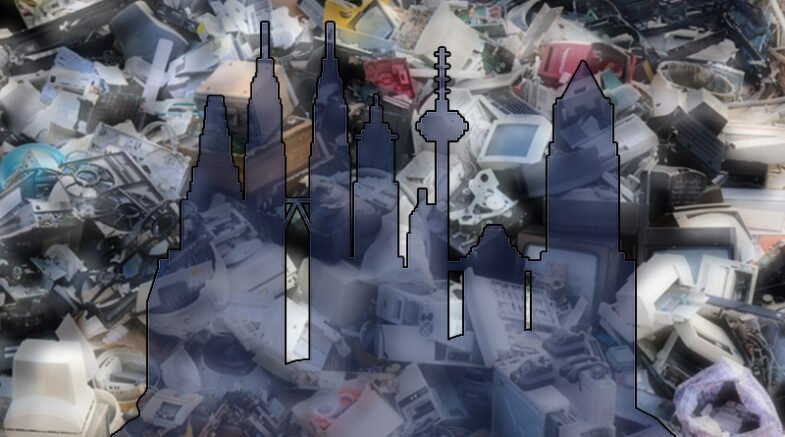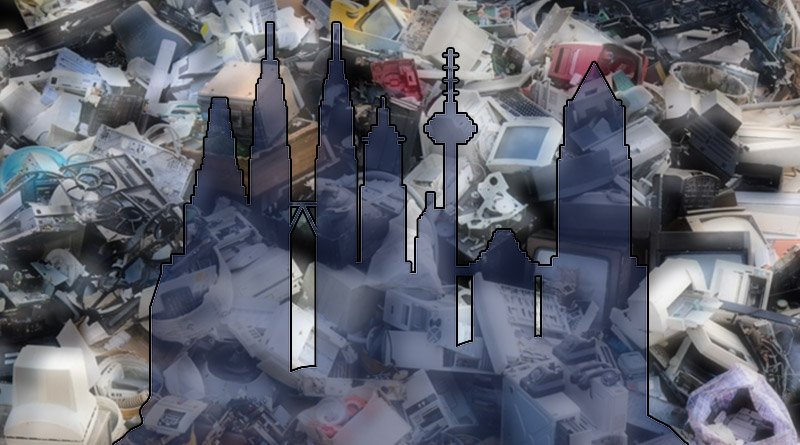A staggering 2.01 billion tonnes of municipal solid waste are produced globally each year, of which a third is not environmentally safe to manage.

One of the fastest-growing categories of solid waste in Malaysia, particularly in terms of recycling, is electronic waste, or e-waste.
364,000 tonnes of electronic waste were produced in Malaysia in 2019, according to the United Nations University’s 2020 Global E-waste Monitor Report.
Both commercial and residential e-waste are included in this. A staggering 2.01 billion tonnes of municipal solid waste are produced globally each year, of which a third is not environmentally safe to manage. People produce 0.74 kilogrammes of waste per day on average, but the range varies widely from 0.11 to 4.54 kilogrammes.
Surprisingly, despite having only 16% of the global population, high-income nations are responsible for producing 34%, or 683 million tonnes, of the world’s waste. Every year on March 18, Global Recycling Day is observed with the primary objective of highlighting the importance of recycling throughout the world.
Given the limited resources on Earth, this supports the goals of a circular economy, which is the accepted model. Recycling is also emphasised by Sustainable Development Goal 12 (SDG 12), which is Responsible Consumption and Production.
The Academy of Sciences Malaysia developed the 10-10 Malaysian Science, Technology, Innovation and Economic (MySTIE) Framework as part of a strategic plan to make Malaysia a knowledge-based economy by design.
Aiming to promote the development of science, technology, innovation, and the economy (STIE), it consists of 10 key drivers and 10 key enablers. In Malaysia, the MySTIE framework identified 10 crucial socioeconomic sectors, including transportation and smart cities.
By using specialised recycling techniques along with extensive material and metal recoveries for a green transportation sector, including wind-based energy and electric vehicles, smart cities and transportation will be made possible.
To promote the proper disposal and recycling of electronic waste, the Malaysian Minister of Environment and Water declared the last Saturday of every month to be the national e-waste collection day in 2021. The top producers of household e-waste in Malaysia in 2021 were personal electronic devices like mobile phones, laptops, and televisions, which accounted for 2459 tonnes of the country’s total collection.
While this development is a step in the right direction, more work needs to be done to educate Malaysians about proper e-waste management practises and disposal protocols, especially for household e-waste.
According to legislative frameworks, e-waste in Malaysia is categorised as a scheduled waste, which imposes specific guidelines and demands for its collection, storage, transport, recycling, and disposal. To categorise various types of scheduled waste in accordance with their effects on the environment and human health, the Department of Environment (DOE) has assigned the scheduled waste code SW110.
This waste category is handled by a number of partial and complete e-waste recycling facilities in Malaysia. However, because there are no specific legal frameworks for managing household e-waste, this portion is managed by the nation’s informal waste management and value recovery sector.
Although the topic of creating regulations for this problem has been discussed in the past, none have yet been implemented. Ongoing debates exist on the positive and negative aspects of Malaysia’s informal e-waste management sector.
My observations show that there are numerous ways for informal waste collectors to make money from the business. There are many informal waste collectors in Malaysia as a result of the lack of household e-waste disposal protocols and the segregation of general waste. E-waste is frequently left unattended in public places, which gives informal waste collectors a chance to operate.
These collectors look for e-waste and other recyclable materials, like cans, bottles, and cardboard, to sell. They typically ride a modified bike or bicycle. Other specialised waste collectors look for materials like scrap metal to sell in the e-waste transaction trade for upcycling purposes and have a value perception of e-waste.
Artisanal e-waste recyclers participate in informal dismantling and value recovery activities in more urban areas, mainly limited to easily recoverable items such as copper from electric cables and transformers.
The typical copper selling price is RM20/kg or US$5/kg, which is lower than licenced businesses’ prices in Malaysia. Cheaper costs with little overhead, such as rent, and fewer technical knowledge requirements drive these informal operations.
Informal dismantling and recycling activities can create significant occupational health and safety risks due to the lack of supply chains for registered partial and full recycling facilities. Additionally, there is less transparency regarding the informal e-waste recyclers’ supply chains, creating potential environmental issues such as mishandling of plastic fractions and the final solid residue of dismantling operations.
Household e-waste items, such as old mobile phones and washing machines, have a perceived value that motivates people to sell them to informal collectors. However, many are unaware of the potential negative impacts of these operations, and there is a need for legislative frameworks to manage them effectively.
Registering informal collectors who use modified vehicles (excluding dismantlers) is preferable under local government bodies.
The extended producer responsibility (EPR) model is an effective solution for most Southeast Asian countries, where producers take responsibility for collecting their distributed equipment and consumers pay a recycling fee upon purchasing consumer electronics.
This idea was presented in the “Unwaste Project” of the UNODC, which the European Union funds in collaboration with the UN Environment Program (UNEP) and UNITAR.
The project aims to address waste trafficking issues between the European Union and Southeast Asia and is specifically focused on Malaysia, Indonesia, Thailand, and Vietnam.
Global Recycling Day on March 18 aims to promote the importance of recycling, and foster a circular economy worldwide. Malaysia has made progress in recycling electronic waste, but much work remains to be done.
Legislative frameworks must be implemented to properly manage household e-waste, and by registering informal collectors and adopting extended producer responsibility (EPR) models, Malaysia and its neighbouring countries can better-manage and create a safer and more sustainable future for all.
